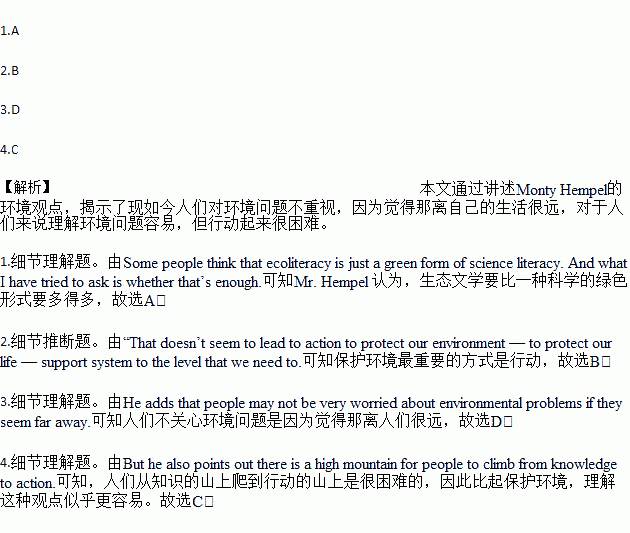题目内容
Monty Hempel is a professor of environmental science at Redlands University in California. He studies ecological literacy-or ecoliteracy (生态素养) for short. Ecoliteracy is the ability to think about and understand the natural processes that make life possible.
Monty Hempel says ecoliteracy gives people knowledge about environmental problems. But he says it does not always work to get them to change their behavior.
Mr. Hempel wrote part of the World watch Institute’s latest State of the World report. He says in his article, “Some people think that ecoliteracy is just a green form of science literacy. And what I have tried to ask is whether that’s enough. In other words, what an ecologically literate person needs to know might include things like the cycles and the flows, the energy systems, all of those kind of things that we would call the science of ecology.”
“That doesn’t seem to lead to action to protect our environment — to protect our life — support system to the level that we need to. Just because that we know, a lot about the environment doesn’t mean that we actually act to save it. After all, actions speak louder than knowledge.”
He adds that people may not be very worried about environmental problems if they seem far away. “Some people call it psychological distance. A lot of climate issues (问题) are worse in the Arctic and most of us don’t spend time in the Arctic. And so, there^ a certain distance. But there’s also a distance that’s happening in the world as it urbanizes (城市化) - people spending more time in front of screens and less time out in nature. We become, if you will, disconnected from the natural systems that used to be the key to success for a human being.”
To help children discover the wonders of nature, children should learn about nature in school, he adds. But he also points out there is a high mountain for people to climb from knowledge to action.
1.From what Monty Hempel says in Paragraph 3, we learn that .
A. ecoliteracy is more than a green form of science literacy.
B. people have learnt more knowledge about ecoliteracy.
C. ecoliteracy can greatly affect how nature works.
D. people with enough knowledge will better protect the environment.
2.In Mr. Hempel’s opinion, which is the most important for environment protection?
A. Knowledge. B. Action.
C. Green living theory. D. Psychological distance.
3.Mr. Hempel thinks people may show no concern about some environmental problems because .
A. they lack knowledge on environment protection.
B. they are closely connected with the nature.
C. the problems are not serious at all.
D. the problems seem to be far away.
4.What can be inferred from the last paragraph?
A. It is the best way to learn about nature in school.
B. Climbing a high mountain is a good way to exercise.
C. It is easier to understand environment protection than to carry it out.
D. people should first collect waste in the mountains to protect the environment.
 阅读快车系列答案
阅读快车系列答案

 t do you 8.(meaning)?” Bob answered 9.(slow),"Well, when there's a party in town, it belongs to my daughter. 10. there's a football game somewhere, it belongs to my son. When I've washed it, and it looks really nice and clean, it belongs to my wife. And when it is dirty, it's mine."
t do you 8.(meaning)?” Bob answered 9.(slow),"Well, when there's a party in town, it belongs to my daughter. 10. there's a football game somewhere, it belongs to my son. When I've washed it, and it looks really nice and clean, it belongs to my wife. And when it is dirty, it's mine."